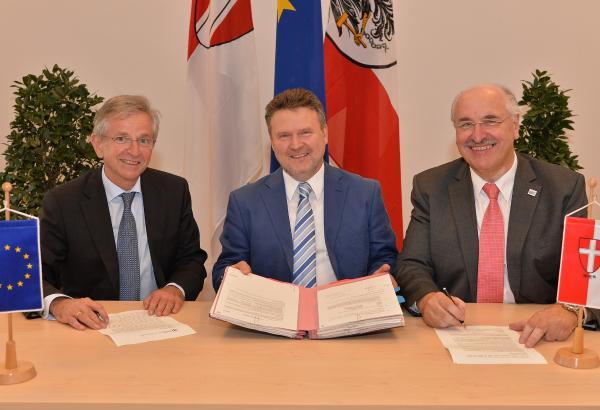
The European Investment Bank (EIB) is making a loan totalling EUR 270m available to the Viennese firm Stadt Wien - Wiener Wohnen to improve the thermal energy efficiency of municipal housing. The funds come from the 2011-2014 investment programme and are divided into two tranches. The first tranche was signed two years ago and this was followed yesterday (Monday) by the signature of the EUR 120m second tranche by EIB Vice-President Wilhelm Molterer and the Director of Wiener Wohnen, Josef Neumayer, which took place in Vienna in the presence of Michael Ludwig, the Vienna City Councillor responsible for Housing and Construction.
At the ceremony for the signing of the contract, Mr Molterer said: “On the issue of energy efficiency we in the EU still have a great deal to do. We still have a long way to go to exhaust the great potential that exists for saving energy. The municipal residential construction sector in particular can make a substantial contribution towards achieving a better energy balance. The EIB considers this to be a crucial area, in which we shall also continue to provide finance as a matter of priority.”
Mr Ludwig pointed out that: “For many years now the City of Vienna has increasingly been engaged in making improvements not only to individual dwellings but also entire districts of the city. With the emphasis on thermal insulation, not only is the environmental situation and thus the quality of life in the city being increased and improved but also the significant reduction in heating costs is easing the financial burden for tenants. The funds made available by the EIB are providing important support in this area.”
“Over the past few years Wiener Wohnen has made improvements to a large number of residential buildings and, in the interests of the tenants, always endeavours to obtain whatever assistance is available. The financial support provided by the EIB will now enable a start to be made on 124 projects covering some 18 000 dwellings in all”, said Mr Neumayer.
Attractive terms
With the funds now being made available the urban housing stock will be modernised and upgraded, the aim being to significantly reduce the energy consumption of rented accommodation. One of the things that makes the EIB loan attractive for Wiener Wohnen is its long-term nature (25 years). Added to that there is the positive signalling effect with regard to other potential sources of finance. Today’s transaction marks the sixth instance of cooperation to date in the long-standing partnership between the EIB and Wiener Wohnen.
Improving energy efficiency by 20 per cent by 2020
Energy efficiency plays a key role in helping to meet the Europe-wide “20-20-20 targets”, which include improving energy efficiency by 20 per cent in the EU by 2020 and thereby lowering energy consumption. The other two targets are to reduce CO2 emissions by 20 per cent and to increase the proportion of electricity produced from renewable energy, which is also due to amount to 20 per cent by 2020.
Energy efficiency measures and the area of resource efficiency in general are one of the EIB’s key concerns. In the past year alone, the Bank has provided loans totalling more than EUR 1.1bn for energy efficiency projects. Over the past five years, the Bank has made more than EUR 70bn available for long-term energy projects in connection with the EU’s energy and climate protection policy and the Member States’ energy strategies.

Photographer: EIB ©PID - Jobst
Download original

Photographer: Dieter Steinbach ©Stadt Wien - Wiener Wohnen
Download original

©Stadt Wien - Wiener Wohnen
Download original

©City of Vienna
Download original